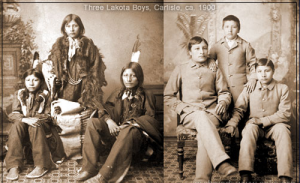
I wrote some time back about how it is imperative for me to be courteous to those who come to my door. This is part of my upbringing as well as a moral obligation stemming from my religious convictions. By and large, I see proselytization efforts as futile and mostly harmless, but the practice has certain assumptions at its core that can lead to behaviors and attitudes that can be quite harmful to those of us in the minority. The assumptions are as follows:
There is one true way. Because there is one true way, all other ways are wrong, bad, or will lead to calamity. People who do not follow the one true way are lost sheep that must be brought back into the fold. Those who follow the one true way have special knowledge and if other people only knew, they would “see the light.” Therefore, we who follow the one true way must convince others to join us so that we may “save” them.
At best, coming to my door with this basketful of assumptions is discourteous. Not only does it take valuable time out of my day, but it’s condescending at best and threatening at worst. There is a certain logic to spreading the word door to door when information is hard to come by. Encyclopedias were once sold this way, as some of you will remember. But now encyclopedias themselves are all but obsolete, nevermind the door to door salespeople, because information is easier to come by than it has ever been. If I want to know about the mating habits of the three toed sloth, members of the 1993 Chicago Blackhawks, five ways to use apple peels, or the philosophy of the Jehovah’s Witnesses, I can access that information at will. I can find just about any translation of the Bible I want, including Greek and Latin, and I can easily search the text. The information is there for just about anyone to access if they want to. It’s safe to assume that most people who are concerned about their immortal soul will take the initiative and seek information for themselves. It’s also safe to assume that most people are capable of judging whether that information speaks to them on a spiritual or religious level.
Unfortunately, the act of proselytization can go beyond condescension and right into threatening. This is why, I suspect, so many Pagans approach a door-to-door religion salesperson with a measure of hostility. Even if it’s not said explicitly, the implication that “If you do not join us, you will go to Hell” is very clearly there. Whether or not you believe in Hell, that’s a threat. The first thing that comes to my mind is the government-sponsored forced conversions of native people in the 19th and 20th century in the US. I’m certain the Borg collective think they’re helping, too.
The only counterargument I’ve seen to this is “We’re the nice ones; we don’t force people to convert.” But that argument carries little weight. Perhaps you’re not stealing our children and forcing them into Christian schools, but proselytization inherently devalues all those who choose not to follow a particular path. Every day and in a million small ways, we Pagans (as well as Atheists, Hindus, “nones,” and “others”) are told that we’re of lesser worth than Christians or other monotheists. It’s really obvious this time of year, especially as the imagined “War on Christmas” rears its ugly head. The door-to-door schtick only expresses this more explicitly. It’s a way of saying “You are wrong; we are right.” It’s no skin off my nose if that’s what a person honestly believes, but there are better ways to fulfill the requirement to preach the good news, as it were, without being quite so discourteous.
I find that it’s easier to talk to someone who takes the approach of sharing their faith in a way that expresses how that faith enriches their lives. In this way, one might extol the virtues of one’s own religion without resorting to the hard sell or judgments of rightness and wrongness. While converting others is not something that interests me, this is the approach I try to take when sharing my faith and practices. This prayer/practice/holiday/viewpoint brings me joy for thus and such reason. I feel closer to my gods when I do/say thus. Using “I language” and avoiding the “shoulds” opens the conversation where the usual preaching on the doorstep tends to shut it down.
It’s not likely that my obscure little blog post is going to change any minds, but I feel that this is a valuable part of the interfaith conversation. In all honesty, I enjoy talking with people who find fulfillment in their faith traditions, whatever that tradition may be. There is a brightness there and a great deal of love that’s beautiful and it really doesn’t matter to me how a person gets there. If the Bible-thumpingest Baptist finds that brightness and love in his or her practice, I want to celebrate that. But I would very much like to have the same respect and courtesy for my own practice and my own connection with the divine. That’s a lot to ask, I know, but if I never say it out loud, no one will know I feel this way.
Oh, and Happy Solstice, GOP.















